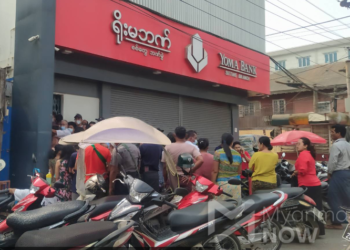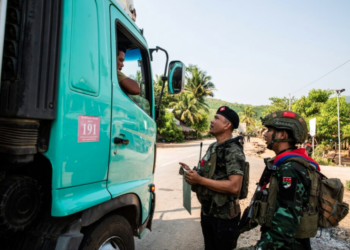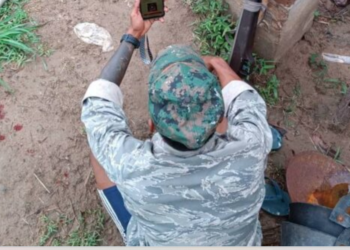The year’s most important holiday is normally a festive time, but this year, few are in the mood for fun
Myanmar Now
Published on Apr 15, 2021
Mandalay should be in full party mode right now. As the city where Myanmar’s last king resided, it has long been seen as a bastion of tradition. And no occasion looms larger on the country’s traditional calendar than the Thingyan water festival that ushers in the Buddhist New Year.
But as the holiday kicked off on Tuesday morning, the city’s streets were littered with broken signboards and power lines brought down by heavy rains and strong winds the night before. It was a scene that served as a reminder of another wave of destruction that has swept through the country, leaving few in any mood for revelry.
For the second year in a row, Thingyan has been put on hold—the first time because of a global pandemic, and now because the country’s people are feeling more defiant than festive in the face of brutal repression that has left more than 700 people dead in the past two and a half months.
“This year, we will mark Thingyan only with revolutionary chants,” said poet and Mandalay resident Kyaw Gyi as he marched with thousands of others to protest the return of military rule after a decade of relative freedom.
To make it clear that this was no ordinary Thingyan, many of the protesters carried clay pots—traditional symbols of the holiday—with pro-democracy slogans painted on them. Some called for the creation of a federal union and a federal army, while others urged Myanmar’s citizens to “Never give up.”
As the protesters passed, their procession was blessed by onlookers with water splashed from the branches of Eugenia bushes—another time-honoured custom repurposed for these revolutionary times.
Red_paint_npt.Jpeg
Protesters launch red paint campaign in Naypyitaw on April 14 (Supplied)
Protesters launch red paint campaign in Naypyitaw on April 14 (Supplied)
Washing away blood
The march was joined not only by local people, but also by groups such as the All Burma Federation of Student Unions, monastic communities, and others who wanted to show solidarity with a city that has borne heavy casualties in the anti-coup struggle.
The junta had hoped to win over Mandalay’s residents by declaring last month that it would allow Thingyan festivities this year, despite the fact that the Covid-19 pandemic is still far from over.
But as the killings continue, few have shown any interest in the regime’s efforts to use the water festival to wash away the blood it has spilled since seizing power.
Thingyan will be quiet in Mandalay this year, Kyaw Gyi told Myanmar Now, because this should be a time to mourn the dead, not to dignify the regime’s lie that the military takeover is merely a return to normal.
In other cities, too, Thingyan has been muted. In Yangon, which has seen massive crowds gather to demand the restoration of civilian rule, many areas are now eerily quiet. Those who do come out into the streets these days do so to protest, not to celebrate.
Meanwhile, a different kind of silence has settled over Bago, a city that is still reeling from a crackdown that killed at least 80 people in a single day last week.
Witnesses said that last Friday’s killing spree by regime forces was carried out with sophisticated weapons of war, indicating that the regime is likely to continue escalating its use of violence against unarmed civilians after Thingyan, if not sooner.
H_56823259.Jpg
Police trucks are parked and block the road in front of the City Hall in Yangon on April 13 (EPA-EFE)
Police trucks are parked and block the road in front of the City Hall in Yangon on April 13 (EPA-EFE)
‘Revolutionary Thingyan’
While the junta’s use of terrorist tactics has succeeded to some extent in subduing protests, many remain determined to keep up the fight.
Student activists in particular have taken the lead in maintaining the momentum. Two weeks ago, they began calling for a “Revolutionary Thingyan”, both on social media and in new journals designed to keep the pro-democracy message alive as the junta continues to tighten control over the internet.
Img_7860.Jpeg
An activist hands out a copy of Molotov journal at a market on April 6 in Ye, Mon State
An activist hands out a copy of Molotov journal at a market on April 6 in Ye, Mon State
Aung Lay, a former member of the Dagon University Student Union, was one of the people who initiated the campaign.
He said that activists came up with the slogan in recognition of the fact that most people would find it impossible to enjoy Thingyan at a time when so many were still giving up their lives for the sake of a better future for their country.
He said that linking the holiday’s significance as a time of renewal to the nation’s desire for radical change has resonated well with the general public.
“The people are with us. There is no water festival in Yangon now, only protests,” he said.
Tuesday’s clay-pot protests were just the start. It was followed on Wednesday with “blood protests”, which had activists using red paint and ink to depict the regime’s deadly attacks on protesters.
On Thursday, there will be car protests, and on Friday a day of silence. Finally, on Saturday, nationwide prayer ceremonies will be held for the heroes who have been killed.
“People’s blood is still flowing due to the extremely brutal shootings. So this year on Thingyan, we will continue with our revolution,” said Mandalay resident Yin Yin.
“We will not recognize anything that the military does. They will never be able to govern us,” she added.
Source – Myanmar NOW ( https://myanmar-now.org/en/news/thingyan-takes-a-revolutionary-turn-as-nation-refuses-to-celebrate-under-a-hated-regime )






